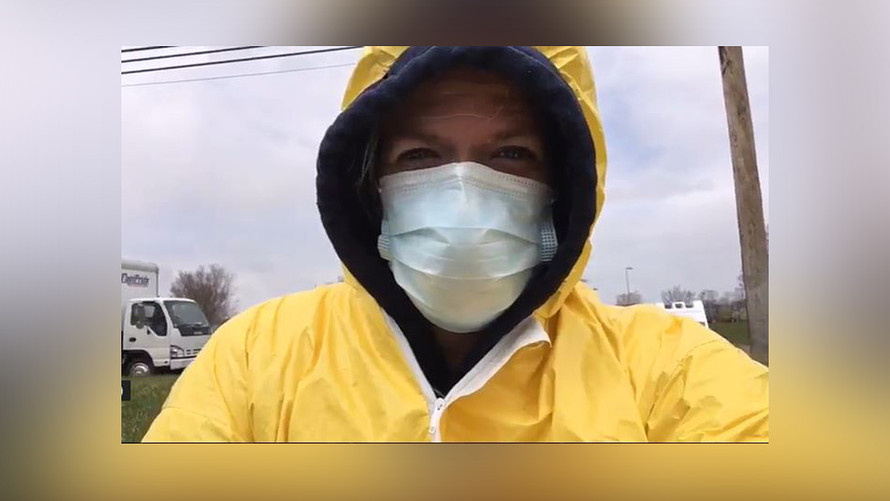
“I have tricks,” Elizabeth Bigos was saying.
Do they involve inserting a 7-inch Q-tip so far up the nostrils that it seems to tap dance on the brain?
“They do,” she said.
Bigos — almost everyone calls her Bitty — is the top nurse at ProHEALTH Care, which describes itself as the largest independent, physician-run health-care organization in the Northeast of the U.S. and has 25 urgent-care centers in all five boroughs of New York City and across Long Island. In normal times, Bitty treats patients with a wide range of ailments, hoping that early intervention will keep them out of the hospital and send them home to recuperate. For the past four weeks, she has been one of the busiest coronavirus testing nurses in the nation’s COVID-19 capital, posted at various drive-up or walk-in testing centers, armed with her distraction techniques and an ample supply of very long cotton swabs.
“When they come into the urgent care,” she said, “it’s palpable how scared they are. They don’t feel well. It’s taken every ounce of energy for them to get here. And now they are staring at me in a full mask and suit. Basically, all they can see are my eyes.”
“ “So much has changed in medicine right now. But that human interaction is as important as ever—more so.” ”
She tries to make a human connection, explaining that what’s about to happen will be uncomfortable—but nothing over the top. “Then, all of a sudden I bring out the Q-tip and—bing! They’re like, ‘What are you gonna do with that?’”
She explains that the procedure requires going up the nostril, then giving the Q-tip a little twist, deeply and firmly enough to collect a dab the lab can evaluate. In and out in 15 to 20 seconds.
“It’s gonna be a really weird sensation,” she warns her patients. “It may feel like I am right at your brain. If you get that sensation, it means I’ve gone far enough.”
Most people have never experienced anything like this before. “I like educating the patients,” Bitty said, “So much has changed in medicine right now. But that human interaction is as important as ever—more so.”
She does what she can to make the process more bearable. “I tilt the chin up so they can’t see it coming,” she said. “I tell them to take a really deep breath. They are so focused on inhaling, the movement of air coming through their nostrils helps hide the tip going in.” She twists and removes.
“I got ya, didn’t I?’” she says. “Then, I give them a short breather before we do the other nostril.”
Clearly, this work is taking a personal toll on the regions’ front-line medical personnel. How could it not? Bitty, 34, has had to send her beloved English mastiff, Big George, to stay with her parents in New Jersey. And she’s had to keep her distance from the man she’s been in a relationship with for the past year.
Also see: NYPD Detective and ‘gentle giant’ Cedric Dixon was the force’s first known COVID-19 death
“In medicine, we come home and share our day with somebody. That’s how we unleash some of the feelings and frustrations that we carry around. But because of his health history and what I do for a living, it is safer for us to be apart now.”
More than 100 tests in, she can’t help but be moved by the patients she is seeing. The newly pregnant women ask the most questions. The first responders and medical people screw up their courage and act like the test is no big deal. “Do what you gotta. Just get it done.” And some patients bring the testing nurse to tears.
A man drove up to the testing tent in Riverhead on Long Island. Bitty walked up to the car and began with the usual questions—what he did for a living, whether he’d had contact with anyone who had COVID-19.
“My wife is in the hospital because of this,” the man said.
“Oh, I’m sorry to hear that,” Bitty told him.
“You know, she is one of you,” the man said. “She’s a nurse. She’s been a nurse for over 40 years. She is great at what she does.”
He sounded so proud of her. “Thank you so much for sharing her story with me,” the testing nurse answered. “I hope you know that God holds a special place in his heart for people who give of themselves. I will keep you and your wife in my prayers. Just thank her on my behalf for everything she has done and everything she has sacrificed.”
Bitty squeezed the man’s hand and got on with the test.
Related: Hundreds of different coronavirus tests are being used — which is best?
“From what he was telling me clinically,” she said later, “his wife didn’t sound too stable. “I’ll be honest, I didn’t think she was going to be one of the survivors, unfortunately. I hope that’s not the case. One of the curses of medicine is that you always know too much.”
As for the man, Bitty didn’t call up his file when the test report came from the lab, but she had a sinking feeling.
“The way he presented, he didn’t look good. All I could think of was that this man cannot be at the hospital to hold his wife’s hand and tell her he loves her and all those wonderful things you want to hear in your last moments. All these patients are deprived of that.”
Ellis Henican is an author based in New York City and a former newspaper columnist.







